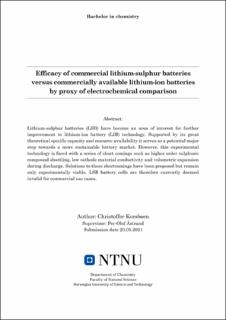| dc.contributor.advisor | Åstrand, Per-Olof | |
| dc.contributor.author | Korsbøen, Christoffer | |
| dc.date.accessioned | 2021-09-28T18:28:44Z | |
| dc.date.available | 2021-09-28T18:28:44Z | |
| dc.date.issued | 2021 | |
| dc.identifier | no.ntnu:inspera:79526771:33107262 | |
| dc.identifier.uri | https://hdl.handle.net/11250/2785469 | |
| dc.description.abstract | Litium-svovelbatterier (LSB) har blitt et område av interesse for ytterligere forbedring av litiumionbatteri (LIB) -teknologi. Gjennom stor teoretisk kapasitet og tilgjengelighet av råmateriale er LSB teknologi et mulig stort steg for et mer effektivt og bærbart batteri marked. Imidlertid står denne eksperimentelle teknologien overfor en rekke mangler. Blant disse er løsning av høyere orden svovelsyreforbindelse, lav ledningsevne for katodemateriale og volumetrisk utvidelse under ladning. Løsninger for disse problemene er foreslått, men forblir kun eksperimentelt levedyktige. LSB-battericeller anses derfor for tiden å være ugyldige for kommersielle bruksområder. | |
| dc.description.abstract | Lithium-sulphur batteries (LSB) have become an area of interest for further improvement to lithium-ion battery (LIB) technology. Supported by its great theoretical specific capacity and resource availability it serves as a potential major step towards a more sustainable battery market. However, this experimental technology is faced with a series of short comings such as higher order sulphuric compound shuttling, low cathode material conductivity and volumetric expansion during discharge. Solutions to these shortcomings have been proposed but remain only experimentally viable. LSB battery cells are therefore currently deemed invalid for commercial use cases. | |
| dc.language | eng | |
| dc.publisher | NTNU | |
| dc.title | Efficacy of commercial lithium-sulphur batteries versus commercially available lithium-ion batteries by proxy of electrochemical comparison | |
| dc.type | Bachelor thesis | |
